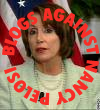OpinionJournal - Featured Article
"When the 9/11 Commission bullied Congress into creating the Directorate of National Intelligence, we doubted that another layer of bureaucracy on top of the CIA would fix much of anything. Our skepticism has since been largely reinforced--most recently by the DNI's reluctance to release what's contained in the millions of "exploitable" documents and other items captured in Iraq and Afghanistan."
William Tierney, former U.N. weapons inspector, recently shared 12 hours "(out of a reported total of 3,000)" of recordings made by Saddam Hussein over the years, with ABC. There are countless documents that were kept by the regime as well.
Now I for one am all for keeping secrets secret, especially for the sake of future intelligence, however, as the OpJournal points out, "America went to war in Iraq and Afghanistan because we believed that the truth about the regimes in those countries justified it. Why should so much of that truth now be deemed so sensitive?"
What can be shared, should be shared. When various of these are released they should be exploited to the hilt to speak to truth. The truth that so many refuse to acknowledge. The naysayers will twist it, but if enough goes out and is combined with a motivated push by the administration; naysayers would have more difficulty keeping their heads in the sand.
According to the article, Congressman Pete Hoekstra, MI 2nd District, yesterday "introduced a bill to require the intelligence community to be more forthcoming with the Iraq and Afghanistan documents. "I'm beginning to believe the postwar intelligence may be as bad as the prewar intelligence," he says. Another person who sees vast room for improvement is Iraqi scholar Kanan Makiya, who founded the Iraq Memory Foundation. While he shares the DNI's concerns about potential damage to some people mentioned therein, he also says the U.S. government has gone too far and needs to find better ways to grant access to this information."
Contact him at: http://www.house.gov/formhoekstra/IMA/email.htm and let him know you support this bill up, down, left, and right.
"How did it come to pass that an opposition's measure of a president's foreign policy was all or nothing, success or "failure"? The answer is that the political absolutism now normal in Washington arrived at the moment--Nov. 7, 2000--that our politics subordinated even a war against terror to seizing the office of the presidency." - Daniel Henninger - WSJ 11/18/05
------------------------------------------------
------------------------------------------------
"the slovenliness of our language makes it easier for us to have foolish thoughts." - George Orwell
------------------------------------------------
------------------------------------------------
Friday, March 03, 2006
OpinionJournal - Open the Iraq Files - Featured Article
Posted by a.k.a. Blandly Urbane at 9:26:00 AM
OpinionJournal - Open the Iraq Files - Featured Article
2006-03-03T09:26:00-07:00
a.k.a. Blandly Urbane
Subscribe to:
Comment Feed (RSS)





















